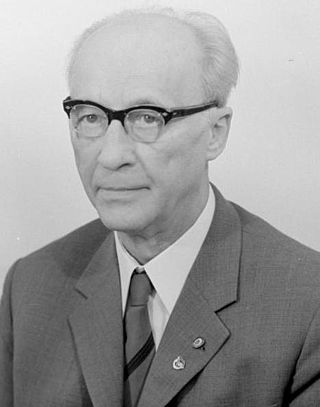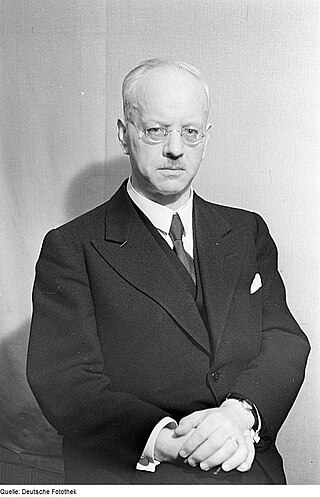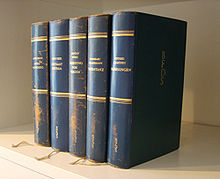
Johannes Dieckmann was a German journalist and politician who served as the 1st President of the Volkskammer, the parliament of East Germany, from 1949 to 1969.
Junge Welt is a German daily newspaper, published in Berlin. The jW describes itself as a left-wing and Marxist newspaper. German authorities categorize it as a far-left medium hostile to the constitutional order.
Jüdischer Kulturbund, or Der Jüdische Kulturbund, was a cultural federation of German Jews established in 1933. It hired over 1,300 men and 700 women artists, musicians, and actors fired from German institutions. According to Jonathan C. Friedman, it grew to approximately 70,000 members, while Saul Friedländer tallies its roster as high as 180,000.

Sports Associations in East Germany were nation-wide sports agencies for certain economic branches of the whole society, which were members of the Deutscher Turn- und Sportbund (DTSB) Members of biggest social employers had their own branch sports clubs or the Sportvereinigung.

Rudolf Herrnstadt was a German journalist and communist politician. After abandoning his law studies in 1922, Herrnstadt became a convinced communist. Despite his bourgeois origins, he was accepted into the Communist Party of Germany (KPD) in 1931 and worked for the Soviet military intelligence service Glawnoje Raswedywatelnoje Uprawlenije. As a foreign correspondent for the Berliner Tageblatt, he worked in Prague (1930), Warsaw and Moscow (1933). He emigrated to the Soviet Union in 1939, days before the Invasion of Poland, where he was active in the fight against the Nazi state as editor-in-chief of the newspaper Freies Deutschland in the National Committee for a Free Germany from 1944 during the German-Soviet War.

The Südkurier is a regional daily newspaper in Germany serving the regions northwest of Lake Constance, Hochrhein and Black Forest with its headquarters in Konstanz. The paper appears with a circulation of around 130,000, six times per week, in Berliner format. The predecessor of the Südkurier was the Konstanzer Zeitung.
Prestel Publishing is an art book publisher, with books on art, architecture, photography, design, fashion, craft, culture, history and ethnography. Lists range from museum guides, to encyclopaedias, art and architecture monographs to facsimile volumes and books for children.

Margaretha "Greta" Kuckhoff was a Resistance member in Nazi Germany, who belonged to the Communist Party of Germany and the NKVD spy ring that was dubbed the Red Orchestra by the Abwehr. She was married to Adam Kuckhoff, who was executed by the Third Reich. After the war, she lived in the German Democratic Republic, where she was president of Deutsche Notenbank from 1950 to 1958.
Hermann Weber was a German historian and political scientist. He has been described as "the man who knew everything about the German Democratic Republic".

Johannes Stroux was a German classicist, scholar of Roman law and organizer of scientific projects and organizations. In 1945 he became rector of the Berlin University and president of the Berlin Academy of Science.

Anetta Kahane is a German left-wing journalist, author and activist against antisemitism, racism and right-wing extremism. From 1974 to 1982 she was an unofficial collaborator for the East German Stasi secret police. In 1998 she founded the Amadeu Antonio Foundation, which she has led since 2003. She has been a target of right wing hate campaigns since 2002 and of possible terror plans since 2015, which are investigated by the German General prosecutor.
Lucie Pflug was a senior cultural official in the German Democratic Republic.

Heinz Kahlau was a German writer.
Heinz Rein was an influential German novelist writing before and after the Second World War. He became a major figure in the "rubble literature" period, and his famous novel Berlin Finale, published in 1947, was one of the first bestsellers of the German rebuilding period.
Herbert Schulze was a German musicologist. Schulze was a proven Schumann expert and for many years chief editor of the Deutscher Verlag der Wissenschaften in Leipzig. In 1969, Schulze was awarded the Robert Schumann Prize of the City of Zwickau.
Hedwig Forstreuter, was a German journalist and writer.
Nathan "Noto" Notowicz was a German musicologist and composer.
Christine Fischer-Defoy is a German woman writer, film director and cultural historian.

Günther Deicke was a German poet and journalist.
The Akademische Verlagsgesellschaft in Leipzig was an important German academic publisher, which was founded in 1906.










